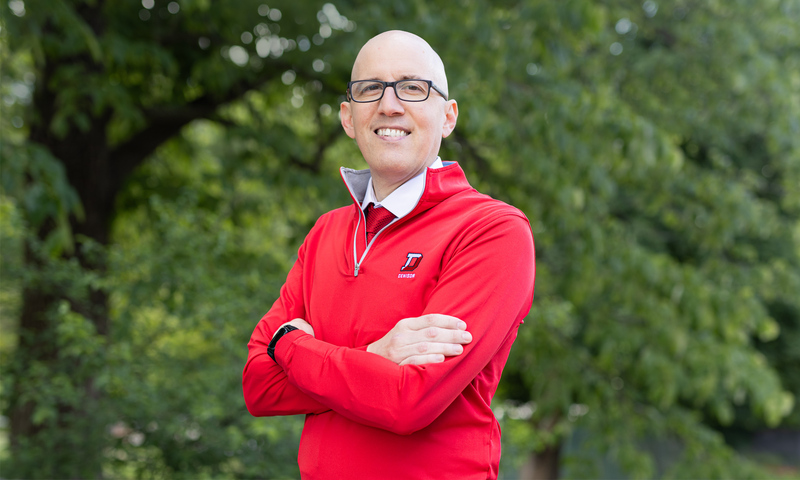Innovative technologies can generate vast amounts of information. Computer models can follow disease outbreaks, for example, or climate change, or the financial success of a Fortune 500 company. But the data itself doesn’t mean much without informed context and interpretation.
That’s the importance of data analytics, Denison’s newest major. It enables our students to take huge amounts of information, interpret it, and wrestle it into effective solutions to our world's most urgent problems.
“Denison’s major in data analytics extends beyond mathematics and computer science classes,” says Jessen Havill, professor of mathematics and computer science and director of the interdisciplinary program. “To be truly meaningful, data analytics must also include expertise of the subject being studied, ethical knowledge to help understand the questions and ramifications of the research, and excellent communication skills, both to discuss the needs of a project when setting up the research, and to share the research in an effective manner. Data analytics is a burgeoning field, and one that we believe is ultimately best learned in a liberal arts environment where students learn to think across disciplines, connect disparate ideas, and communicate complex ideas.”
When creating this new major, the college considered how this explosion of evidence is already informing vital decisions across the private sector, academe, and government. The available data span a multitude of disciplines and issues, including population, genomic, textual, environmental and meteorological, geographic, demographic, educational, economic, consumer behavior, social network, behavioral, medical, historical, multimedia, movement and political data.
With this major, Denison graduates will have the ability to learn how to work with quantitative and qualitative data, big and small, to identify puzzles, probe questions, evaluate claims, make inferences, and effectively communicate data-driven answers to problems. They will be well positioned to expand knowledge, influence policy, and be the decision makers of the future across virtually every profession.
“Almost every profession, from marketing to product development to public health, is being reshaped by data analytics,” says President Adam Weinberg. “Denison’s historic strengths in computer science, mathematics, and the social sciences combined with our proximity to Columbus, give us an opportunity to do something unique and incredibly important.”
This new program, rooted in the liberal arts, is built upon the strengths of Denison’s curriculum. Since 2009, Denison has been offering computer science courses that focus on computational problems in the natural and social sciences. Likewise, faculty have created statistics and quantitative methods courses in several departments, including biology, economics, mathematics, physics, psychology, political science, and sociology. These have laid the foundation for the data analytics major.
Denison students already are exploring this field. Professor Matt Neal teaches a data analytics class in which students are working in teams to solve real-world challenges. One team is working with law enforcement in Australia, using police reports to find ways to predict the frequency and severity of domestic violence incidents. In effect, they are becoming experts in a particular segment of police work. Students are coordinating this effort through Cambridge professor, criminologist and Denison alumnus Lawrence W. Sherman ’70, who also has accepted two Denison students to intern with him this summer at the University of Cambridge in England. In addition to continuing their research with Sherman, they will help police officers with their masters’ theses, educating them about how to use data analytics, and helping them to clean and organize their data.
A second team in Neal’s course at Denison is working with alumnus Nic Covey ’04 at The Nielsen Company. They are helping to solve world hunger problems by determining how much food will be needed to feed projected populations.
Denison is uniquely poised to create this program because of its strengths across traditional liberal arts disciplines, excellent mathematics and computer science professors, an engaged and enthusiastic alumni network with access to real-world problem-solving opportunities and internships, and the college’s close proximity to Columbus, with its research, business and entrepreneurial community.
The major, which will be offered to students beginning this fall, has four major components:
- Four classes in total of mathematics and computer science. Calculus and statistics, as well as two computer science classes are an essential platform for the technical side of data analytics.
- Three classes of interdisciplinary work – this is the area of inquiry to which the student feels most drawn. Students will complete a capstone project in this field.
- Four specially designed data analytics courses. Three of these are project-based, employing both analytic methods and liberal arts skills. Students will learn communications skills specific to data analytics, ethics, and interdisciplinary research, practiced in a variety of application domains.
- A required summer internship. Students will take the skills learned in the classroom and practice them in a professional setting.
Associate Provost Jim Pletcher, summarized, “Data Analytics will equip our students with the tools needed to grapple with 21st century problems, the skills to communicate their findings, and the knowledge to place both within a deep understanding of society and ethics.”

